Mental health claims up 46 per cent as workers find their voice: Allianz
Australian workplaces have seen an explosion of mental illness over the past five years, with compensation claims for psychological issues up almost 50 per cent.
Australian workplaces have seen an explosion of mental illness over the past five years, with a 39 per cent increase in sick leave and almost a 50 per cent rise in the number of compensation claims for psychological issues.
And each claim involves an average two and a half months off work, according to insurer Allianz Australia.
The staggering statistics are a warning to employers that post-Covid, it is mental rather than physical illness that is likely to determine the future of work and the key decisions around job design, corporate culture and strategic hiring and training.
Allianz analysed workers compensation claims made between the 2019 and 2023 financial years and found a 46 per cent increase in the rate of psychological claims and a 39 per cent increase in the average days taken off work due to mental health.
The latter equates to 76 days off for each claim in the 2023 financial year.
The report, released on Tuesday, says that over the past five financial years, primary and secondary psychological claims were more likely to involve time off work than physical claims. It found “work-related harassment” and “work pressure” are the main drivers of primary psychological claims.
But with an overwhelming number of workers – 70 per cent – reporting that in the last 12 months they have changed their attitude to the role of work in their lives, the question for employers is what really is behind the big increase in mental health reporting.
Have workplaces become worse places to be or are employees expecting more from their bosses and feeling more empowered to claim for mental health assistance?
Julie Mitchell, chief general manager, personal injury at Allianz Australia, said: “It’s really tricky to put a finger on what is driving the growth in claims but from the research we’ve just done in terms of sentiment and what we’re hearing from people, there are some shifts that we’re seeing here.
“The role of work in people’s lives is continuing to change. Fatigue and burnout has become a wider topic and then there’s this piece around the importance of having work-life balance, and then there’s this interesting piece about people speaking up in the workplace. People are feeling more comfortable about speaking up.”

Allianz reports that managers are seeing a shift around the role of work, with 77 per cent of managers saying their teams’ approach/attitude has changed in the last 12 months: that their employees are more aware of the importance of having work-life balance (41 per cent); that their employees implement more flexibility during the work week (41 per cent); and that they speak up at work more when faced with an issue (29 per cent).
The problem is that about one in five workers say their organisation has done little to address workplace mental health issues, and 32 per cent of managers still say that their employees are most worried about securing a promotion or pay rise to mitigate cost of living pressures.
The insurer says that the way to tackle the rise in workplace mental health issues is to understand worker expectations and align practice accordingly.
The report says: “Organisations plan to spend a combined $11.5bn over the next 12 months on workplace mental health initiatives, an average of $16,040 per organisation, which while encouraging, is only a partial solution to the growing rate of mental health concerns in the workplace.”
Ms Mitchell said harassment and bullying were the primary causes cited in claims, while work overload was a secondary cause.
Workers also reported dissatisfaction with their remuneration because of the cost of living, along with work pressure because of the skills shortage.
She said research on multi-generational workplaces revealed that employers’ policies and practices and leadership needed to be nuanced to take account of the different drivers and motivations in different generations.
Ms Mitchell said there was now more discussion about mental health in workplaces, with more surveys issued by employers to measure employees’ experience. She said the key to managing compensation claims was to prevent them happening but also getting people the correct treatment quickly, and getting people back to work faster.
The average time off work for mental health was 76 days or two-and- a half months. “That’s a long time away from the workplace, to be disconnected from your leaders, to be disconnected from your colleagues. So there’s a lot of anxiety that comes around the return to work. So, having that early intervention, really good leadership practices, the ability to have a human-centred conversation with your colleagues … and encourage someone back into the workplace and normalise things once an injury has happened, whether physical or mental … The best way to help somebody get better is to get back to work.”
Mitchell said the increase in claims showed a “set and forget approach” to management was no longer possible.
“There are new trends that we need to adapt to – the cost of living pressure; tightening up on things like your reward and remuneration (policies); making sure that you’ve got really good career planning for people,” she said.
“All of those things are really much more heightened than they were 12 months ago.”






To join the conversation, please log in. Don't have an account? Register
Join the conversation, you are commenting as Logout